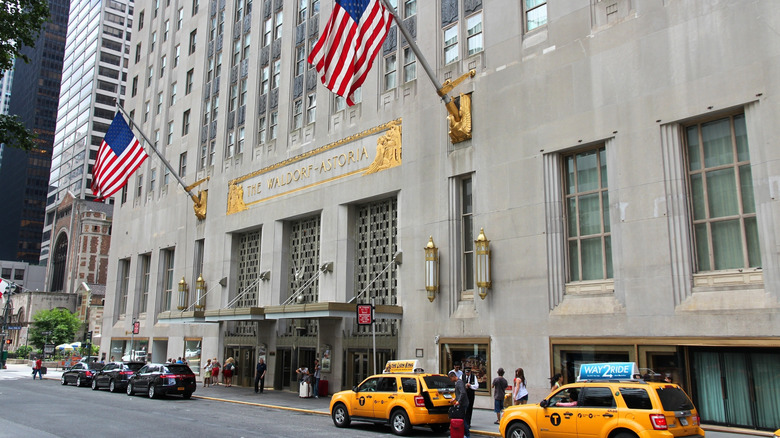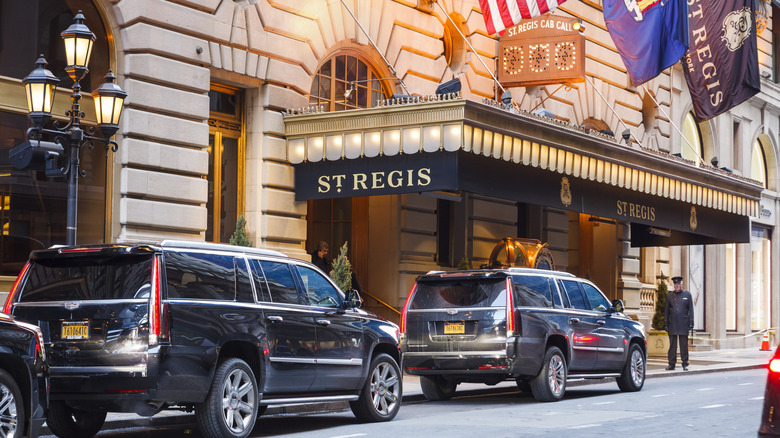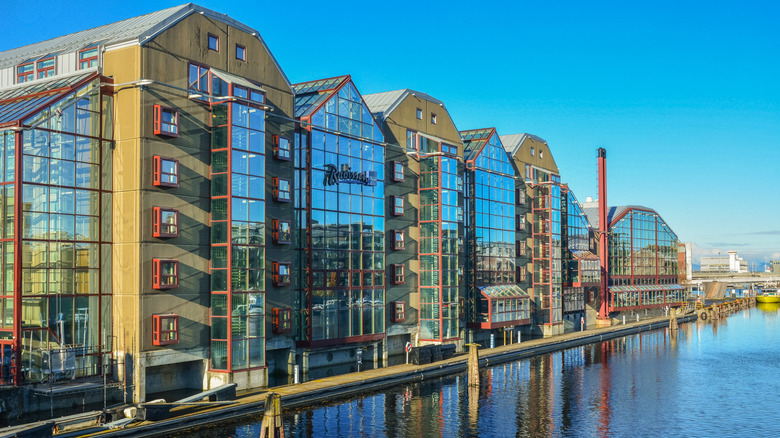The Luxurious Hotel Lines That Are Owned By Mysterious Chinese Companies
It's no secret that in the final decades of the 20th century and the first few of the 21st, the People's Republic of China has modernized itself into global dominance. It's the world's second-largest economy after the United States and leads global production of many household and business items, from tech to textiles. In recent years, the country has banked on innovation and self-reliance, influencing economies and exerting its massive influence on trading partners and emerging markets while simultaneously focusing on internal industry expansion.
One way in which China has advanced its global interests is through real estate, particularly in luxury markets. In the 2010s, Chinese companies started buying luxury real estate brands in the United States, including the Waldorf Astoria in New York, Loews Santa Monica Beach Hotel, Four Seasons Jackson Hole, and New York's JW Marriott Essex House. In the decades since then, various luxury hotel portfolios have passed through multiple Chinese-led hospitality groups.
While this move has drawn criticism, particularly as the United States government continues to reckon with modern national security and the balance of global trade, the fact remains that in the free market system, some of your favorite luxury hotel brands are legally owned by Chinese companies under somewhat mysterious circumstances. In some cases, they're owned by the Chinese government outright, as in the case of the famed Waldorf Astoria in New York, which is one of the most anticipated hotel re-openings of 2025 after a season of drama tied to mysterious Chinese companies.
One Chinese insurance company's real estate empire started and ended with the Waldorf Astoria in New York
Anbang Insurance Group made international headlines when it purchased the famed New York Waldorf Astoria from Hilton Worldwide in 2014 in a deal worth almost $2 billion, making it the most expensive hotel ever sold at that time. A former small insurance broker in China that dealt in auto and property insurance, the company suddenly started banking and managing assets, possibly through favorable support from the Chinese government. Its CEO, Wu Xiaohui, was once married to the granddaughter of former Chinese leader Deng Xiaoping. In 2016, two years after the Waldorf purchase, Anbang purchased Strategic Hotels & Resorts Inc. from Blackstone Group in a deal reportedly worth about $6.5 billion. As one report described it, the situation was "a global buying spree that made Anbang emblematic of China's unbridled appetite for international trophy assets." The portfolio included properties like the Loews Santa Monica Beach Hotel and Four Seasons Jackson Hole.
Soon after, Starwood Hotels and Resorts — whose portfolio includes Regis, Sheraton, and Westin hotels, to name a few — was in the process of being acquired by Marriott International. At the last minute, Anbang offered to outbid Marriott. Marriott then topped Anbang's bid, but Anbang came back once again with a higher offer. Somewhat mysteriously, after Marriott topped the Anbang bid yet again, the Chinese insurer retreated. Ultimately, Starwood and its luxury portfolio went to Marriott.
In 2018, Anbang was back in the news when Wu was arrested for alleged fundraising fraud and embezzlement. After Wu was convicted and sentenced to 18 years, the government seized Anbang and sold all its luxury hotel properties to a Korean asset management group with the exception of New York's Waldorf Astoria, which remains under the Chinese government's control.
Chinese companies are stakeholders in a number of well-known, upscale and luxury hotel chains
A Chinese company called HNA was making similar property buy-ups during the 2010s, including the purchase of a stake in Hilton properties that ended up being worth over $6 billion, including Hilton Grand Vacations and Parks Hotels & Resorts, Inc. Formerly an airline, HNA had expanded rapidly, encouraged by China's then-new free market. But it didn't last long. As the Chinese government started regulating foreign investments, HNA faced mountains of debt despite sell-offs. Then the global pandemic hit, effectively wiping HNA off the financial map.
In 2018, Shanghai-based, state-run hospitality group Jin Jiang acquired half of Radisson Hospitality's shares, taking over operational activities for the higher-end Radisson Blu properties around the globe, including Chicago, Mykonos, and Nice, which makes it the seventh-largest hotel operator in the world. Jin Jiang also has a stake in Accor, though the percentage has fluctuated over time, and famously acquired French budget chain Groupe du Louvre around 2014. Accor is a hospitality company that runs thousands of resorts and hotels around the world, including luxury brands like Sofitel, Banyan Tree, and Fairmont. It once had additional Chinese partnerships and stakeholders like Alibaba and Huazhu, but those partnerships have ended and the shares have been sold. There's still a lot of Chinese-owned luxury real estate to be found, though the boom isn't quite the same as it was prior to the COVID-19 pandemic.
From buying sprees of luxury hotels and the luxury real estate market to expanding and modernizing cities like its financial capital, Shanghai, or what Rick Steves calls "a futuristic city," to Daxing, the world's largest airport terminal known as Beijing's architectural masterpiece, China continues to expand its influence at home and abroad.


